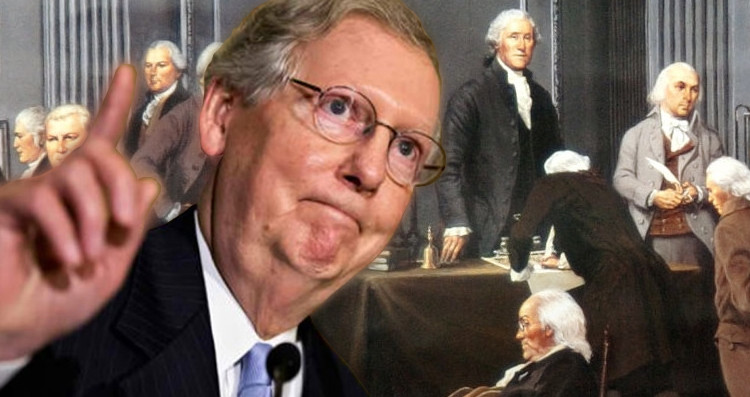
Republicans love to lie about the nation’s Founding Fathers.
Republican myths run strong. They are always ranting and raving on about the similarities between themselves and the Founding Fathers – which is interesting, as in most ways they could not be any different.
Below are 4 examples of how the Republican Party puts out false information in regards to the Founders and their intentions.
MYTH 1: The American Revolution was a rebellion against “Taxation without representation”, similar to the modern day Republican tax revolts.
THE TRUTH: Actually, the Boston Tea Party was ultimately a protest against a corporate tax cut, whereas the modern Republican Party is in favor of tax cuts.
The original Boston Tea Party was a protest against the British East India Company (BEIC) for receiving huge corporate tax cuts. By the 1760s BEIC was dominating trade from India to China as well as in the Caribbean. They controlled nearly all commerce to and from North America with the help of those tax cuts, along with subsidies and special dispensation from the British crown.
MYTH 2: The founding fathers wanted limited federal government.
THE TRUTH: Actually the Founders were a diverse group, oftentimes with opposing viewpoints. For instance Alexander Hamilton and his Federalist Party believed in a strong federal government and a powerful executive branch. George Washington supported this view as well.
At the same time, Thomas Jefferson and his Republican Party (which bears no relation to the modern GOP) supported strong states’ rights and a weak federal government. Madison supported this viewpoint as well.
MYTH 3: The Constitution demands strict and literal interpretation.
THE TRUTH: As was the case with the issue of federal government, there was much dispute over how to interpret and apply the Constitution, and one cannot overlook the fact that the Constitution was only ratified in the first place with the understanding that the Bill of Rights would be added later.
Hamilton and his Federalist Party espoused a strong federal government, led by a powerful executive branch and endorsed a liberal reading of the Constitution; although he resisted the label at first, Washington clearly belonged to this camp. Indeed Washington and Hamilton’s embrace of an expansive view of the interpretation of the Constitution runs diametrically opposed to that of the Tea Party, who tend to embrace the theory of originalism, the viewpoint that any interpretation of the Constitution must take into account and abide by the original intent of the Founders.
MYTH 4: created a “Christian Nation” founded upon “Christian Principles”.
THE TRUTH: One need look no further than to Thomas Jefferson to understand the false nature of this claim.
“Millions of innocent men, women and children, since the introduction of Christianity, have been burnt, tortured, fined and imprisoned; yet we have not advanced one inch towards uniformity.” –Thomas Jefferson, Notes on Virginia, 1782
And one cannot forget that Jefferson strongly advocated the separation of church and state:
“Believing with you that religion is a matter which lies solely between man and his God, that he owes account to none other for his faith or his worship, that the legislative powers of government reach actions only, and not opinions, I contemplate with sovereign reverence that act of the whole American people which declared that their legislature should ‘make no law respecting an establishment of religion, or prohibiting the free exercise thereof,’ thus building a wall of separation between church and State.” –Thomas Jefferson, letter to Danbury Baptist Association, CT., Jan. 1, 1802
The Treaty of Tripoli, introduced to the Senate by John Adams and ratified by unanimous decree, was signed by Adams in 1797 and includes the following passage for any doubters out there:
“As the Government of the United States of America is not, in any sense, founded on the Christian religion; as it has in itself no character of enmity against the laws, religion, or tranquillity, of Mussulmen; and, as the said States never entered into any war, or act of hostility against any Mahometan nation, it is declared by the parties, that no pretext arising from religious opinions, shall ever produce an interruption of the harmony existing between the two countries.” – The Treaty of Tripoli, signed Nov. 4, 1796, effective Jun. 10, 1797

You must be logged in to post a comment Login